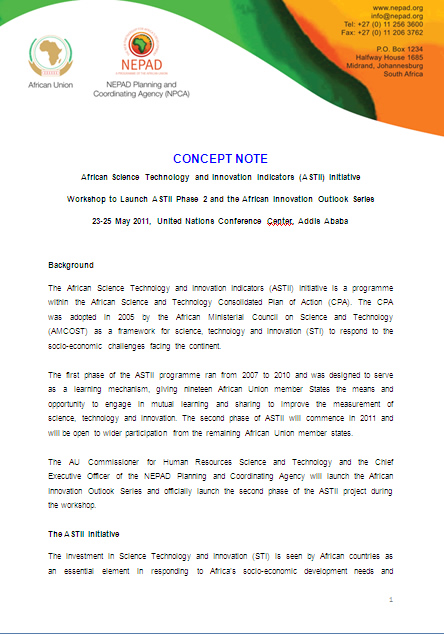By Seimu Babalola
Addis-Ababa, Ethiopia 24/11/011- The first African Innovation Outlook which captures major issues affecting Science Technology and Innovation, in the continent’s has been launched with a call on leaders to invest more in the sector as a way of fast tracking the socio-economic development in Africa.
Speaking during the public presentation of the 136 pages document on Wednesday at the United Nations Economic Commission for Africa (UNECA) Conference Centre in Addis Ababa, Ethiopia (UNECA), the NEPAD Planning and Coordinating Agency, Chief Executive Officer, Dr. Ibrahim Assane Mayaki underscored the importance of planning and availability of relevant data that can ease the implementation of AU-NEPAD programmes
“As NEPAD is the technical execution organ of the AU; we have specific focus on implantation of policies and knowledge management. We at the African Union Commission consider Information Technology as flagship program, it has to be own, it need to have regional dimension”, Dr. Mayaki said.
Thirteen African countries participated in the Research and Development (R&D) survey and ten countries conducted the Innovation survey, which form part of the Outlook. Basically it provides information and inform on the state of science, technology and innovation. The survey was conducted in nineteen countries.
The second phase of the African Science Technology Innovation Initiative (ASTII) was also launched at the ceremony. About ten countries have so far indicated their interest in participating in the next phase.
Giving an overview of the ASTII phase 2 programmess, the director NPCA Programme Implementation and Coordination Directorate, Mrs Estherine Lisinge-Fotabong told the audience that for reason of resource constraints not all countries will participate. She however, urged the countries that have made their participation known to be committed to the project.
According to her”, being involved demands a lot of commitments. Therefore, countries which to participate should be ready to display high sense of commitment. The main thrust of the survey will include the training of personnel’s at continental and sub-regional levels. The R&D survey will be annually, while that of innovation will be carrying out after three years”.
Welcoming the participants on behalf of Professeur. Jean-Pirre-Ezin, Commissioner for Human Resources, Science and Technology, Mrs. Vera Ngosi, said that “’the Innovation Outlook was the direct response of recommendations from experts”.
She call upon African states to put “enough resources to sustain the program, by ensuring that it is mainstream into national, regional and continental levels said STI remain the platform that could bring about social transformation in the continent”.
The Sweden Counselor for regional Cooperation, Anton Johnston, in his remark described the publication as “an important milestone in the development of a strong STI sector. He said ASTII has made “tremendous progress in the last two years adding that the Outlook will assist policy makers identifies areas of prospect for research, constraints and prospects”.
In her key note address on Science, Technology and Innovation Indicators for evidence –based policies, Dr. Watu Wamae of RAND, United Kingdom, underscored the need for African leaders to allocate more resources into the agriculture sector. She said while it is important to strengthen the manufacturing sector, it should not be at the expense of agriculture.
“Most African economies are dominated by agriculture, the demand for natural research will continue to grow and they will continue to expand. The onus is on us to provide data that will benefit the people”, Dr. Wanae added.




